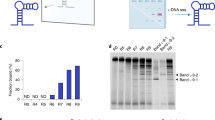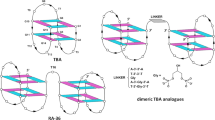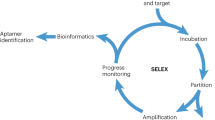Abstract
APTAMERS1 are double-stranded DNA or single-stranded RNA molecules that bind specific molecular targets. Large randomly generated populations can be enriched in aptamers by in vitro selection and polymerase chain reaction1–11. But so far single-stranded DNA has not been investigated for aptamer properties, nor has a target protein been considered that does not interact physiologically with nucleic acid. Here we describe the isolation of single-stranded DNA aptamers to the protease thrombin of the blood coagulation cascade and report binding affinities in the range 25–200 nM. Sequence data from 32 thrsombin aptamers, selected from a pool of DNA containing 60 nucleotides of random sequence, displayed a highly conserved 14–17–base region. Several of these aptamers at nanomolar concentrations inhibited thrombin-catalysed fibrin-clot formation in vitro using either purified fibrinogen or human plasma.
This is a preview of subscription content, access via your institution
Access options
Subscribe to this journal
Receive 51 print issues and online access
$199.00 per year
only $3.90 per issue
Buy this article
- Purchase on Springer Link
- Instant access to full article PDF
Prices may be subject to local taxes which are calculated during checkout
Similar content being viewed by others
References
Ellington, A. D. & Szostak, J. W. Nature 346, 818–822 (1990).
Blackwell, T. K. & Weintraub, H. Science 250, 1104–1110 (1990).
Blackwell, T. K. & Weintraub, H. Science 250, 1149–1152 (1990).
Kinzler, K. W. & Vogelstein, B. Nucleic Acids Res. 17, 3645–3653 (1989).
Thiesen, H. J. & Bach, C. Nucleic Acids Res. 18, 3203–3208 (1990).
Kinzler, K. W. & Vogelstein, B. Molec cell. Biol. 10, 634–642 (1990).
Chittenden, T., Livingston, D. M. & Kaelin, W. G. Jr Cell 65, 1073–1082 (1991).
Joyce, G. F. Gene 82, 83–87 (1989).
Robertson, D. L. & Joyce G. F. Nature 344, 467–468 (1990).
Green, R., Ellington, A. D. & Szostak, J. W. Nature 347, 467–468 (1990).
Tuerk, C. & Gold, L. Science 249, 505–510 (1990).
Hultman, T., Stahl, S., Moks, T. & Uhlén, M. Nucleosides and Nucleotides 7, 629–638 (1988).
Fenton, J. W. Semin. Thromb. Hemostat. 14, 234–240 (1987).
Bode, W. et al. EMBO J. 8, 3467–3475 (1989).
Rydel, T. J. et al. Science 249, 277–280 (1990).
Author information
Authors and Affiliations
Rights and permissions
About this article
Cite this article
Bock, L., Griffin, L., Latham, J. et al. Selection of single-stranded DNA molecules that bind and inhibit human thrombin. Nature 355, 564–566 (1992). https://doi.org/10.1038/355564a0
Received:
Accepted:
Issue Date:
DOI: https://doi.org/10.1038/355564a0
This article is cited by
-
An AuNPs-based electrochemical aptasensor for the detection of 25-hydroxy vitamin D3
Analytical Sciences (2024)
-
Development of synthetic modulator enabling long-term propagation and neurogenesis of human embryonic stem cell-derived neural progenitor cells
Biological Research (2023)
-
Platelet glycoprotein V spatio-temporally controls fibrin formation
Nature Cardiovascular Research (2023)
-
High-affinity one-step aptamer selection using a non-fouling porous hydrogel
Nature Biotechnology (2023)
-
A high-dimensional microfluidic approach for selection of aptamers with programmable binding affinities
Nature Chemistry (2023)
Comments
By submitting a comment you agree to abide by our Terms and Community Guidelines. If you find something abusive or that does not comply with our terms or guidelines please flag it as inappropriate.



